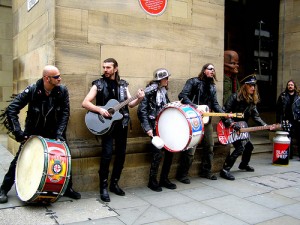On this day in 1819, during a pro-democracy rally in Manchester’s St. Peter’s Field, utter bloody carnage fell upon the peaceful protestors when the local yeomanry set about the crowd of 60,000 with sabres drawn, trampling and hacking down fifteen men, women and children – the first to die was a two-year-old torn from his mother’s arms – and injuring another 600. Despite having dressed in their Sunday best as evidence of their peaceful intent, the crowd stumbled and staggered out of St. Peter’s Field and right into the history books; for the outrageously oppressive and heavy-handed policing of this massacre took place under the noses of journalists from the Times, the Mercury, the Political Register, and the Manchester Observer – who, with an ironic reference to the Battle of Waterloo four years earlier, coined the incident ‘Peterloo’. The eyewitness reports and press coverage caused a public outcry. In Italy, Percy Bysshe Shelley heard of the horror and his outraged response was the 91-verse The Masque of Anarchy – which would be banned until 1832. The government’s response was yet more repression. By the end of 1819, new legislation known as the Six Acts was introduced to suppress radical meetings and the press. And by the end of 1820 civil liberties had declined to an even lower level than before Peterloo while every significant working-class reformer was in jail. This effectively marked the end of the first phase of working-class radical protest; the next major upsurge would not occur for another ten years.
But why were the British working class still so very far behind their French counterparts? Unfortunately, in the early 1800s, with the French having already staged their revolution, the British working class was still shackled to an archaic and unjust parliamentary system which only allowed male landowners to vote and offered no representation at all for newly emergent industrial towns, whilst a ‘rotten borough’ like the ancient settlement of Old Sarum – a ghost town since the 11th century and possessed of only one voter – retained its historic right to elect two Members of Parliament. The 1815 Corn Laws – a tariff on all foreign grains which protected the interests of landowners but forced food prices up and led to famine and chronic unemployment – further exacerbated unrest. Wary of a revolt, the Tory government responded with ferocious suppression, clamping down on free speech and public meetings. In Manchester, where there was no parliamentary representation at all, the newly formed Manchester Patriotic Union Society called for a meeting to consider and support ‘the propriety of adopting the most legal and effectual means of obtaining Reform of the Commons House of Parliament’. They secured as their key speaker the finest radical orator in the country, Henry Hunt. And so on that fateful day of 16th August, the working class of Manchester and its environs began to gather at midmorning. But as the crowd grew larger, local magistrates – observing the proceedings from nearby – determined without any good reason that Hunt and the other speakers on the hustings should be arrested. The Manchester Yeomanry, a local militia comprised of sabre-wielding middle-class tradesmen, most of whom were fiercely antagonistic to the reform movement, surged into the crowd blades swinging, in order to force a path to the platform. They cut down all those who stood in their way. Was this an early form of Class War being enacted in front of the nation’s startled press?
On the evening of Wednesday 29th October 2008CE, the Black Sheep – as part of their Joe Strummer Memorial Busking Tour – paid homage to the Peterloo martyrs by singing protest songs on the site of the massacre. Several people who worked locally, however, knew nothing of Peterloo and stopped to enquire as to what was going on. Julian pointed to the red commemorative plaque just four feet above the group’s heads. Perhaps it is – in the hustle and bustle of today’s world –unfair to judge negatively these working people who had never noticed that red plaque before, nor paused to consider this significant moment in history when their working class ancestors had been slaughtered whilst peacefully protesting for basic civil rights that we take for granted today. But as evidenced by the G-20 London Summit protests in 2009 – and in particular the implausible failure to charge the police officer filmed whilst striking down Ian Tomlinson, who died shortly after as a result of his injuries – these ‘basic rights’ are nothing to take for granted.



6 Responses to 16th August 1819 – The Peterloo Massacre